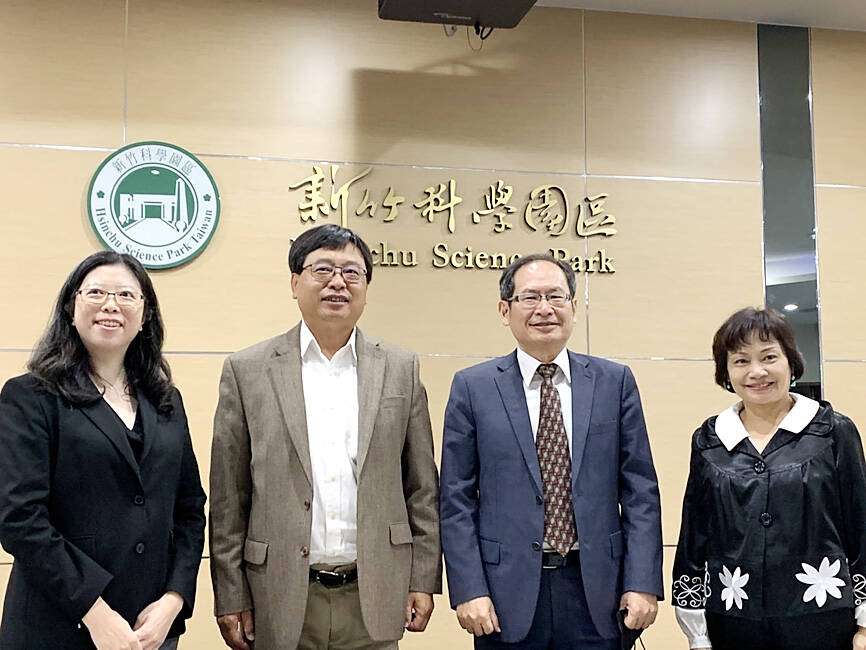Taiwan Semiconductor Manufacturing Co (TSMC, 台積電) is to build a wafer fab deploying 1 nanometer (nm) process technology at the Longtan (龍潭) campus of Hsinchu Science Park (新竹科學園區), Hsinchu Science Park Bureau Director-General Wayne Wang (王永壯) said yesterday.
The bureau completed a pilot project in the middle of last month for the third expansion phase of the Longtan Science Park (龍潭科學園區) in Taoyuan to accommodate the new TSMC plant, Wang told a news conference.
The pilot expansion project has been submitted to the National Science and Technology Council, which would next forward the project to the Cabinet for approval, Wang said.

Photo: Grace Hung, Taipei Times
“The efforts by the government to push for the construction of TSMC’s 1-nanometer process fab are proceeding smoothly,” he added.
Local media reports have said that the Longtan park’s third expansion phase would cover 150 hectares.
As 90 percent of the land is privately owned, it would require a huge effort to expropriate the land needed, the reports said.
2-NANOMETER FAB
Meanwhile, a new expansion plan in the Central Taiwan Science Park (中部科學園區) passed its third review yesterday, clearing the way for its final passage during a general review early next year, which would allow TSMC to build a 2-nanometer fab by the middle of next year, the Central Taiwan Science Park Administration said yesterday.
The administration said in a statement that it would submit supplementary information about the second-phase expansion plan to the Environmental Protection Administration as soon as possible after receiving a written record of the review.
The administration aims to complete all administrative procedures and hand over the land to local foundry companies to build new factories by the middle of next year, it said.
It added that it plans to attract other technology firms to set up facilities in the park to support the expansion and development of the semiconductor industry in Taiwan.
The development project would create NT$485.7 billion (US$15.95 billion) in production value a year and 4,500 direct jobs, the statement said.
TSMC plans to start pilot production of 2-nanometer chips in the second half of 2024 and commence mass production in 2025.
Its development of 2-nanometer process technology is progressing well and is even a little ahead of its schedule, TSMC chief executive C.C. Wei (魏哲家) said in October.
Customer engagement with the 2-nanometer chips is comparable with their engagement with the company’s 3-nanometer and 5-nanometer chips, he said.
TSMC said its 2-nanometer technology would be the most advanced in terms of density and energy efficiency when it is introduced.
ARIZONA FAB
The company is scheduled to hold a “first tool-in” ceremony for its new Arizona fab today to mark the installation of the first batch of production equipment, with US President Joe Biden expected to attend the event.
The company is spending US$12 billion to build a 5-nanometer fab in Arizona, with mass production to start in 2024. It plans to introduce 3-nanometer process technology during the second phase of the Arizona investment.

Shares in Taiwan closed at a new high yesterday, the first trading day of the new year, as contract chipmaker Taiwan Semiconductor Manufacturing Co (TSMC, 台積電) continued to break records amid an artificial intelligence (AI) boom, dealers said. The TAIEX closed up 386.21 points, or 1.33 percent, at 29,349.81, with turnover totaling NT$648.844 billion (US$20.65 billion). “Judging from a stronger Taiwan dollar against the US dollar, I think foreign institutional investors returned from the holidays and brought funds into the local market,” Concord Securities Co (康和證券) analyst Kerry Huang (黃志祺) said. “Foreign investors just rebuilt their positions with TSMC as their top target,

REVENUE PERFORMANCE: Cloud and network products, and electronic components saw strong increases, while smart consumer electronics and computing products fell Hon Hai Precision Industry Co (鴻海精密) yesterday posted 26.51 percent quarterly growth in revenue for last quarter to NT$2.6 trillion (US$82.44 billion), the strongest on record for the period and above expectations, but the company forecast a slight revenue dip this quarter due to seasonal factors. On an annual basis, revenue last quarter grew 22.07 percent, the company said. Analysts on average estimated about NT$2.4 trillion increase. Hon Hai, which assembles servers for Nvidia Corp and iPhones for Apple Inc, is expanding its capacity in the US, adding artificial intelligence (AI) server production in Wisconsin and Texas, where it operates established campuses. This

H200 CHIPS: A source said that Nvidia has asked the Taiwanese company to begin production of additional chips and work is expected to start in the second quarter Nvidia Corp is scrambling to meet demand for its H200 artificial intelligence (AI) chips from Chinese technology companies and has approached contract manufacturer Taiwan Semiconductor Manufacturing Co (TSMC, 台積電) to ramp up production, sources said. Chinese technology companies have placed orders for more than 2 million H200 chips for this year, while Nvidia holds just 700,000 units in stock, two of the people said. The exact additional volume Nvidia intends to order from TSMC remains unclear, they said. A third source said that Nvidia has asked TSMC to begin production of the additional chips and work is expected to start in the second

US President Donald Trump on Friday blocked US photonics firm HieFo Corp’s US$3 million acquisition of assets in New Jersey-based aerospace and defense specialist Emcore Corp, citing national security and China-related concerns. In an order released by the White House, Trump said HieFo was “controlled by a citizen of the People’s Republic of China” and that its 2024 acquisition of Emcore’s businesses led the US president to believe that it might “take action that threatens to impair the national security of the United States.” The order did not name the person or detail Trump’s concerns. “The Transaction is hereby prohibited,”